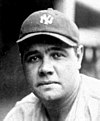fiction.wikisort.org - Movie
Babe Comes Home is a 1927 American silent sports comedy film produced and distributed through First National and directed by Ted Wilde. The film is a baseball-styled sports film centering on Babe Ruth and Anna Q. Nilsson.
| Babe Comes Home | |
|---|---|
 | |
| Directed by | Ted Wilde |
| Written by | Gerald Beaumont (short story 'Said With Soap') Louis Stevens (scenario) |
| Produced by | Wid Gunning |
| Starring | Babe Ruth Anna Q. Nilsson |
| Cinematography | Karl Struss |
| Distributed by | First National Pictures |
Release date |
|
Running time | 60 minutes (6 reels, 5,761 feet) |
| Country | United States |
| Languages | Silent film (English intertitles) |
The film was released in the short-lived Vocafilm sound-on-film process, presumably a music and effects soundtrack but no dialogue. The film is considered a lost film.[1]
Synopsis
Babe Dugan, star player of the Angel baseball team, chews tobacco and gets his uniform dirtier than any other player. Vernie, the laundress who cleans his uniform every week, becomes concerned over his untidiness; Babe calls to apologize for unintentionally striking her with a ball during a game; and his pal, Peewee, falls in love with Vernie's friend, Georgia. On an outing to an amusement park, a roller coaster throws Vernie into Babe's arms; soon they are engaged, and Vernie plans to reform him. Scores of tobacco cubes and spittoons are pre-wedding gifts, and they precipitate a lovers' quarrel. But Babe takes the reform idea seriously, though his game slumps and he is put on the bench. At a crucial moment, Vernie relents and throws him a plug of tobacco; and consequently he delivers a four-base blow.[citation needed]
Cast
- Babe Ruth - 'Babe' Dugan
- Anna Q. Nilsson - Vernie
- Ethel Shannon - Georgia
- Louise Fazenda - laundry girl
- Arthur Stone - the laundry driver
- Lou Archer - Peewee
- Tom McGuire - Angels team manager
- Mickey Bennett - mascot
- James Bradbury, Sr. - ball player
- Guinn 'Big Boy' Williams - a baseball player
- James Gordon - a baseball player
- Ralf Harolde - Baseball Fan (uncredited)
- Helen Parrish - Babe Dugan's daughter
See also
- Headin' Home (1920), also starring Babe Ruth
- Breaking into the Big League (1913)
- Casey at the Bat (1927)
References
- "Silent Era : Progressive Silent Film List". www.silentera.com. Retrieved June 19, 2017.
External links
- Babe Comes Home at IMDb
- Babe Comes Home at SilentEra
- Posters to the film
- Synopsis at AllMovie
Другой контент может иметь иную лицензию. Перед использованием материалов сайта WikiSort.org внимательно изучите правила лицензирования конкретных элементов наполнения сайта.
WikiSort.org - проект по пересортировке и дополнению контента Википедии
